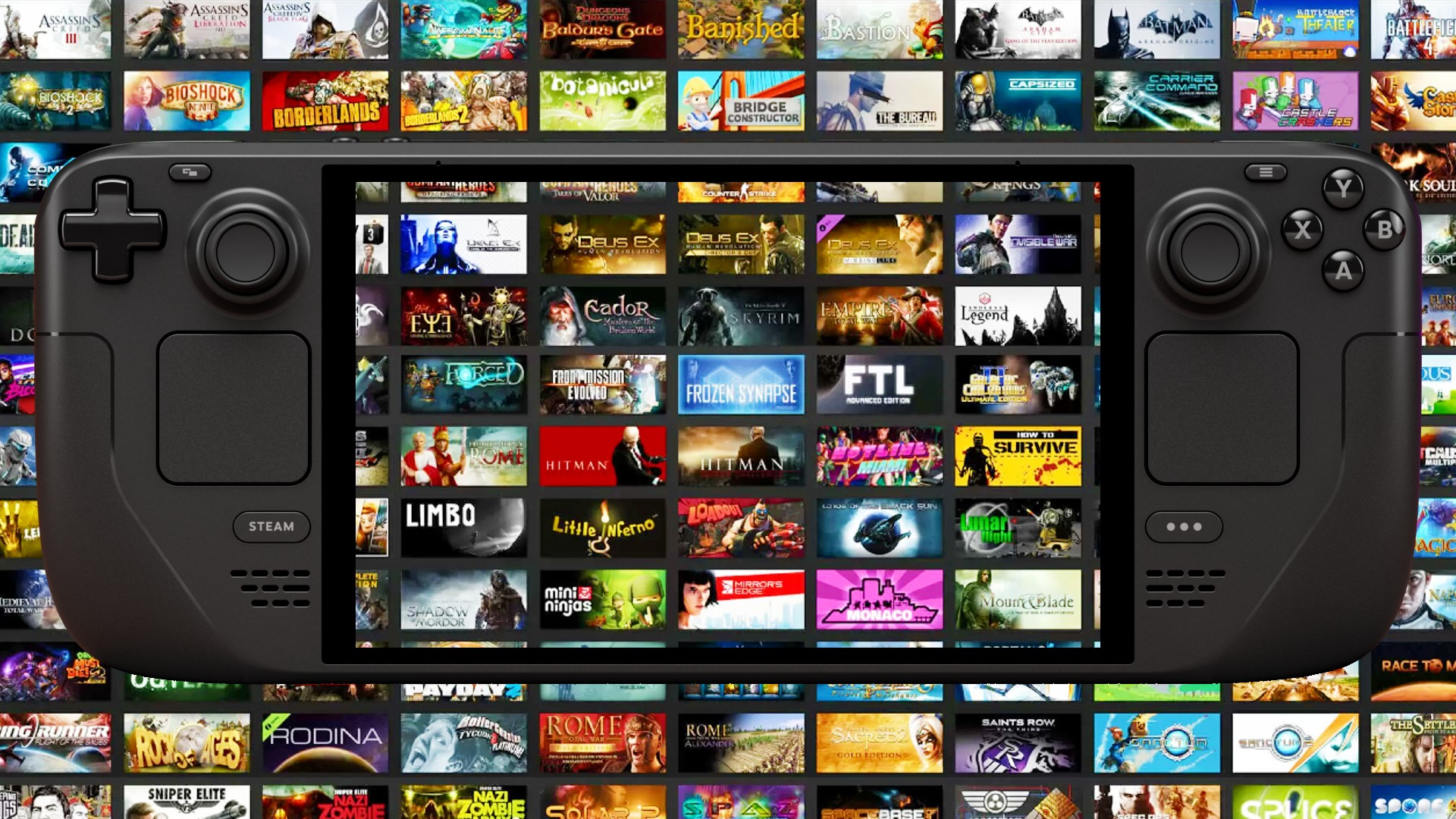- cross-posted to:
- [email protected]
- cross-posted to:
- [email protected]
And also, whenever the next one comes along that library will still be there
Every other console you have the concept of “backwards compatibility” as a feature rather than an expectation.
To be fair that’s because software on consoles is designed for specific hardware. With newer hardware the old games won’t just work, because they were complex for very specific hardware. So for BC you end up with emulation which requires a lot more processing power than the original hardware, and is not perfect.
Or using the old hardware like the PlayStation 3 BC for instance, they literally had the PS2 hardware in the PS3 to handle BC. And as time went on they removed that hardware to save costs and BC went with it.
PC gaming however, and by extension portables like the Steam Deck however are running software developed more generically for wider ranges of architecture to begin with. It means less hardware optimization, but it generally means compatibility out of the box as hardware improves since it wasn’t designed with extremely specific hardware anyway.
This is less true since the PS4/XB1 era, since it’s just pretty standard x86 hardware, much like a PC. Although it may still apply to the Switch if they go in a different direction for the Switch 2.
thats if the switch 2 isnt still just standard arm hardware, much like a phone.
Even the Switch is pretty standard phone hardware
Or using the old hardware like the PlayStation 3 BC for instance, they literally had the PS2 hardware in the PS3 to handle BC.
And the PS2 likewise literally had PS1 hardware to handle BC.
Many PS2 titles also used the PS1 hardware for game functionally so some PS2 titles have bugs on newer PS2 models with the hardware removed.
where can I learn more about these games?
where can I learn more about these games?
There are PS2 that had this function removed?
Not removed per say, they switched from using a Native IOP like the PS1’s processor to replicating the functionality with a PPC chip, codenamed Deckard. The emulation isn’t as good as original hardware, and PS2 games which used features of the IOP chip can have bugs as a result.
Functionality was never removed from PS2, they simply switched from a native PS1 IOP solution to replicating it in software via a PPC chip.
Sure but this did cause bugs in some games.
I’m surprised the difference isn’t much higher, but I guess there’s a ton of shovelware on the Switch.
It is much higher. Those are just the officially approved numbers. You can get a lot more games than that working though. Most will probably run out of the box anyway, or with just slight tinkering, assuming the performance of the Deck suffices of course. You may have to create custom control mappings though.
Slight tinkering and slight annoyances. Like some text is hard to read or unreadable, button/key prompts are wrong. Frame limiting being wonky, sound glitches. But all in all still amazing to be able to play your stuff on the go.
Yup. I’ve just been purchasing games without the Verified tag now because I’ll just be like: “yeah that seems like it’d work and it typically does”.
I made the mistake of installing Stardew Valley on it for 1.6. Oof, I’m playing it everywhere. Very bad when you can’t handle your addictions well.
Some aren’t even that egregious. A game having a launcher, or requiring you to manually bring up the keyboard, for example, keeps it from being verified.
So Monster Hunter Rise, a game that works flawlessly, launched as “playable” because it required you to manually evoke the keyboard when typing your name in character creation.
Yeah, a few examples from my own Deck include Rymdkapsel (works perfectly, not verified or marked as Chromebook Ready), Surviving Mars (playable, but not rated) and Turmoil (explicitly unsupported, but works fine).
it’s linux native tho
Doesn’t matter for how they’re measuring. None of those games are marked as either Verified or Playable by Valve, so they’re not included in these statistics, despite working fine on the Deck.
It’s mouse and keyboard only though, not impossible but for someone who doesn’t want to fiddle with Steam Input bindings it’s a bit of a pain.
Which one of the three games I listed are you talking about?
Was talking about Turmoil, should’ve been more clear on that, sorry.
respectfully, how have you not seen the infinite rivers of shovelware on steam since they stopped vetting the store ~10 years ago?
I’d be surprised if many of those are verified for steam deck?
Yeah. They probably work fine on the deck too, but they can only verify so many games and those are low priority.
That seems to be the point being made by the person you replied to; the difference should be higher (in favor of the Steamdeck) because of the vast quantity available on Steam. The shovelware is precisely why it should be higher. I think they’re expressing surprise that the Switch even comes within the range it does, hence bringing up Switch shovelware as a possible source for this.
ah, i see, you’re probably right
Steam is the same way
Shovelware? That’s a new term for me… Is that what they call the games made in Roblox and the like?
Shovelware means games that are really low quality that some studios spam to try and get any money with little effort. Like garbage free to play games on mobile.
Gotcha, thanks.
Also asset flips too (when you buy assets to make a game and slap them together with no effort and sell it as a game).
You know those cheap Disney ripoff movies? Like Finding Nemo comes out and then anyone with a copy of Blender and a few hundred bucks to spend on distribution starts selling “The Little Lost Fish?” The video game equivalent of that is called shovelware.
It’s quite a lot more than that if you count all the titles that work but aren’t verified, I imagine!
And you can emulate the Switch on the Deck.
Also I can emulate a steamdeck on my desktop without being sued!
Why?
Because the games that run on the Steam Deck are PC games, no emulation required. It’s a joke.

This is cracking me up
It’s a joke.
https://en.wikipedia.org/wiki/Poe’s_law
OP is also the guy who thinks it is weird to pre-heat your oven. https://fedia.io/m/[email protected]/t/763821/Are-the-people-who-read-terms-and-conditions-the-same#comments
Are you my stalker? Do we get to be friends now?
No and no. I specifically use the notes function in kbin / mbin to tag odd accounts, just like back then through RES & MassTagger on Reddit.
Wait what’s his tag?! What’s my tag? “No preheat” and “Eats ketchup”?
Depending on their Desktop’s architecture it might be required, arm systems do need to utilize CPU emulation to run programs made for x86-64. It’s not usually as involved as emulation of a console platform but it’s emulation no less.
Steam Deck is an AMD APU that is AMD64/x86_64 architecture.
They were talking about “emulating a Steamdeck on their desktop” implying that their desktop isn’t a SteamDeck.
Because Nintendo are disgustingly anti-consumer.
My steam deck is also just stable as my switch now despite that not being the case when I first got mine.
Me too. When I first got it I would have hesitated to recommend it to the more luddite kind of people in my life but as it is now it barely needs a warning. Only thing really right now is making sure they understand the compatibility ratings.
My 13-year-old niece loves mine, lol.
More like 129% considering I can play all the Switch games on a Deck.
As an owner of the Switch (with a huge backlog) and a dreaming owner of the Steam Deck, should I be happy or worried about the backlog?
Yes
🥲
Play the games that interest you, not that you have others waiting in the corner.
Do you have a steam account already? Do you have a gaming pc of any variety?
I love my deck, but I’m a nearly 20 year steam user. If you have a backlog and no steam account, why would you give yourself more of a backlog? (Although the emulation ability of the deck is fantastic, but again, why did a bigger back log hole?)
I do have a Steam account and some games bought there (from years ago, I basically stopped because I didn’t have a proper PC at that time… And that hasn’t changed actually), and so many others from giveaways
The “strongest” PC I have is a MacBook Pro 2014 with Windows 10/boot camp lol (it is almost the highest tier of that model) so yeah, that is basically not having anything (I remember it struggled to run Tomb Raider reboot, one of the games that I bought).
If you have a backlog and no steam account, why would you give yourself more of a backlog? (Although the emulation ability of the deck is fantastic, but again, why did a bigger back log hole?)
Basically this, I am lacking a proper device that can emulate GCN/Wii/PS2 games in a hybrid way such as the Switch.
I have a Nvidia Shield TV Pro 2019 that can do some of that and a phone with Snap Dragon 865 which definitely can run those games, but sadly it doesn’t have HDMI video out capabilities.
Also yesterday I was messing around with my hacked Switch and saw that Dreamcast and N64 emulation on RetroArch are better than before (I didn’t try it too much, but at least Conker Bad Fur Day and Crazy Taxi ran well, both in handheld and docked mode) and that is good and I want that for the consoles I cannot run properly yet.
Also I am a bit disappointed that some PSP games have issues with the latest version available of PPSSPP for the Switch… Android version should be better…
I’ll tell you that while my modded Switch was easily my favorite system, getting a Deck completely made it obsolete for me. It’s been gathering dust ever since.
Don’t get me wrong, if you’re someone that primarily plays Nintendo exclusives then the Switch is still great. But if you mostly just use it to play your games on the go, and modded it to emulate, the Deck is an easy recommendation.
Plus it’s, imo, the best gateway into PC gaming. It’s reasonably powerful, easy to use, and lets you start building a pc library that will stay with you regardless of new game generations. Free multiplayer and sales are also a nice bonus.
If you’re interested you should look into EmuDeck.
The only aspect I think the Deck lacks is the seamless TV input, I suppose there is a dock for it, but something is telling me the games (depending on which ones) won’t look as nice as they do in the handheld (opposite as how it is handled in Nintendo)
You can bump the resolution, so that’s not an issue. The only problem is, depending on the game, higher resolutions will be harder to run.
So actually it’ll usually look better than the Switch. Same resolution or higher, with graphics options to make it look even better.
Sounds like a deck is perfect for you, I’d recommend the refurbished 512 led (got one for mom, she’s loving it, and hasn’t had a single problem), or the smallest LCD and a large memory card.
Emulation is a breeze, and it’s a pretty powerful gaming PC in it’s own right. I rarely push it, but I’ve run Witcher 3, which was as good as my 5 year old "gaming"laptop, and baldurs gate 3 runs decently. I’ve seen my buddy run ‘no man’s sky’ at what looked like buttery 60fps, though he didn’t have the overlay turned on. I’d recommend a cheap Bluetooth mouse and keyboard, and a kickstand unless you’re going to play it hooked up to the TV, then you’ll need a pass through power cable and usbc-> TV input adapter (HDMI), or the dock that they sell, but I haven’t had reason to try one.
Hey, at least your purchase is transferred!
Isn’t that comparison asinine? I mean… Yeah, no shit. One is a handheld PC and the other isn’t.
They’re competitors on form factor. Actually, the one difference you mention is precisely why I’ll probably be buying a SteamDeck instead of a Nintendo Switch. I can play Nintendo games on both after all.
They are only competitors for people who are fairly ignorant. Steam deck comes with the ability to play switch games for free…
Nintendo coming to shut down valve 💀
I mean, I wouldn’t buy into a decade old ecosystem either if I hadn’t already. But by that logic, there is less games on my WiFi router than on the Xbox. Same form factor after all.
That’s not what form factor means
I beg to differ.
Form factor is a hardware design aspect that defines and prescribes the size, shape, and other physical specifications of components, particularly in electronics.[1][2] A form factor may represent a broad class of similarly sized components, or it may prescribe a specific standard. It may also define an entire system, as in a computer form factor.
https://en.m.wikipedia.org/wiki/Form_factor_(design)
What do you think of as “form factor”?
You’re right, it was totally meant to group together devices which share zero characteristics outside being vaguely the same size and shape.
Do a subnet router running on Debian in a data center with an ATX board and my gaming PC have the same form factor?
Are you trying to equivocate motherboard form factor (a specific terminology used for the sizes and locations of screw-holes in motherboards) with entirely different types of device that happen to have similar shapes and sizes?
The motherboards in those computers could have the same motherboard form factor, but that doesn’t make comparing a rack-mounted router with specific design constraints to your gaming PC a reasonable thing to do. Your gaming PC is, most likely, far better at its job than a router in a data centre would be, and the DC router is most likely far better at its job than your gaming PC would be, because they’re totally different categories of device. Likewise, a Wifi router and an Xbox are totally different categories of device. Even discussing just form factor alone, the Wikipedia summary you posted includes:
other physical specifications of components
An Xbox lacks many of the things considered as basic functionality for a router, such as a second Ethernet port. Likewise, a wifi router tends to lack many of the things considered crucial for modern game systems, such as a GPU and video output. In both cases it’s perfectly possible (at least in theory, though I’m sure at least one person has actually done it) to reconfigure one for the alternative purpose, but that is utilising the device well outside of its design parameters.
You realize that’s the argument you’re making…?
7:56 am and I can rest assured I’ve already read the dumbest thing I’ll read today.
While the Steam Deck is technically a handheld PC, as a Linux enthusiast who’s tried to use the desktop mode for laptoppy things… No it isn’t.
It works in a pinch (well… Not for my job, but I also don’t expect Valve to put lxd into SteamOS), but the comparison to the Switch (which I also own) is much better than comparing it to even a gaming laptop. In fact, if I were the type of person to emulate stuff (which, don’t worry Nintendo, I totally am not), I would say my Steam Deck makes a better switch than my switch. If I’d emulated a Switch to play Mario Kart (which obviously I haven’t) I’d say it was a better experience on my Steam Deck than on my switch.
While the Steam Deck is technically a handheld PC, as a Linux enthusiast who’s tried to use the desktop mode for laptoppy things… No it isn’t.
Desktop mode is literally just KDE, and you can install whatever OS you want on it anyway. In what way is it not a handheld PC?
I think they mean functionally.
I know everytime I’ve had to do extended work in desktop mode I’ve had to use a USB mouse and keyboard. Obviously, it’s a handheld PC, but it’s not really designed to replace your laptop.
You could use it as a desktop computer with a dock though, I suppose.
It’s not supposed to replace a laptop.
You could use it as a desktop computer with a dock though, I suppose.
Companies making similar products seem to be aiming for this use case (for example, the GPD Win 4 has an optional dock, and can connect to an external GPU (they even sell one) through its USB 4 port).
What I’m saying is that the PC comparison simply misses the point, whereas the Switch comparison is a comparison of how the devices are intended to be used (and for the most part actually used). The Steam Deck is not a good device for running a development environment or most of the things one thinks of as “PC tasks.” It’s not designed for that.
One can use it in that way, but one of the biggest differences between the Steam Deck and its “more pc-ish” competitors like the Ally is that Valve has done a lot of work to make desktop mode unnecessary for the vast majority of users. The user experience puts it much more directly in competition with the Switch than with other handheld PCs, and that’s a strength of the Deck, not a weakness.
One can install Linux on a Switch too, at which point it’s basically an ARM-based handheld PC. But a reviewer who reviewed the Switch for its power as a handheld Linux machine would be missing the point too.
Sorry but no, you’re the one who missed the point. The point (in the comment you originally replied to) was that it’s obvious a handheld PC will have more games than the Switch, as the Switch is a console that came out a few years ago while PC games have been a thing for decades.
Whether or not you consider the Steam Deck a handheld PC doesn’t change this.
If it’s “just a handheld PC,” how do I setup cups as a service that starts on boot?
The answer: as a minimal change I have to enter developer mode and understand that the next update will wipe that away. (If I want to use it for this purpose regularly, it’d be better to install another OS, at which point you might as well call the Switch a handheld PC too.) This is a limitation of the Deck, but it’s a very intentional one. It’s a gaming appliance first and foremost, which makes the comparison to other gaming appliances apropos.
Are “Steam Deck has X many games that Valve have certified on it, up from Y 17 minutes ago” articles particularly useful? Only really to people who are using them for ad revenue. But that doesn’t make the comparison to the Switch a bad one. In fact, comparing the Steam Deck to the Switch is a better comparison than comparing it to a gaming desktop.
Did you even read the comment you replied to? The last line was:
Whether or not you consider the Steam Deck a handheld PC doesn’t change this.
You then proceeded to try and convince me it isn’t a handheld PC in your comment, anyway.
I don’t want to argue the semantics of whether or not it is a handheld PC (it’s pretty subjective anyway); I’m just saying since it uses hardware and software which is common to PCs it can run most games a “normal” PC can, which means it can run way more games than the Switch (even if you install Linux on your Switch you won’t be able to run the vast majority of PC games, as they’re built for x86 processors).
The original comment in this thread compared the Steam Deck to a PC to highlight the fact that the amount of games available on these platforms isn’t comparable, so articles such as this are pointless (especially when it’s wrong, as the difference in the amount of games you can play on the Switch and the Deck is way more than 29%). You replied that calling it a PC is wrong, but that comment was only calling it a PC to highlight this obvious difference.
I don’t want to argue the semantics of whether or not it is a handheld PC
And yet that’s exactly what you’re doing, and missing the forest for the trees as you do so…
That’s an embarrassingly small number of games for a PC… a PC should have access to far more games than that. I’m sure that’s just the “verified” games, but it’s pretty dumb to flaunt it like it’s something impressive.
Definitely just verified, the actual number is easily triple that.
Not to mention even tons of unsupported games work perfectly fine.
Ugh! We don’t want larger games! We want more games!
As a Lenovo Go user that can access both worlds this is an interesting article to see where I stand in terms of overall access to games. But shouldn’t a Steamdeck have more titles? As far as I know you can’t you also side install Windows for games from other platforms?
This is just steam titles in the verified program. Protondb has 21k steam games that are reported working, and there’s also non-steam games and emulation.
It’s should also include the entire switch library.
Concerning my usage of Emudeck it should also contain nearly every other console.
deleted by creator
I don’t own anything Nintendo but I thought there would only be like 200 games.
If you exclude shovel-ware games it’s likely around that amount, maybe a bit more. There’s a lot of shovelware on the Switch (usually paid ports of free mobile games that would’ve been driven by ads normally).
I bet the amount of games that are what most would consider fully compatible is much higher than the amount of green checkmark games (valve just doesn’t have time to check every single game out there).
What I would consider falling in that category is full Xinput controller support, no keybinding necessary, and Fully functional under proton. Yes you can get other games working but that’s the optimal conditions for normies to play the games without fiddling.
Tried to get steredenn working on Steam deck in February. Failed miserably (controls didn’t work).
Works on switch (within it’s limitations of course).
Take that 😂
Btw steredenn is even Linux natively, that’s what made me even more angry.
Edit: What’s with the downvotes? I mean it’s fine but - if I did something wrong or it works since date x, tell me!
Btw steredenn is even Linux natively, that’s what made me even more angry.
That’s basically the issue… especially older Linux ports run worse than the Windows version. I hope Valve will eventually consider setting Proton as the default for some games even when they are native, as their ports are usually abandoned and outdated.
I tried everything the ui is able to to, proton and all, to no avail.
It also works with the major Switch emulators, although maybe you meant that.
Haha, nice to know but no 😁.
Try switching it to launch the windows version through Proton instead of the Linux version. Loads of games work better that way I’ve found, since a lot of the Linux versions don’t get the same level of support.
















